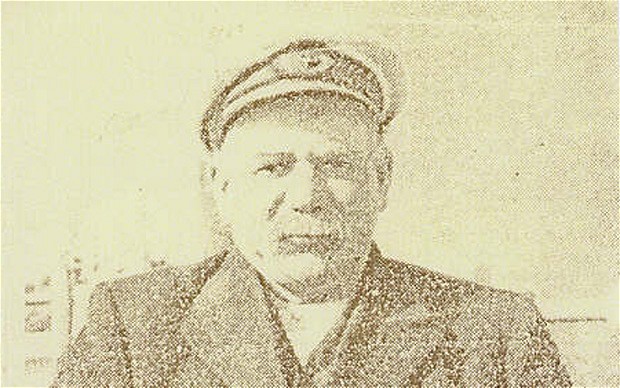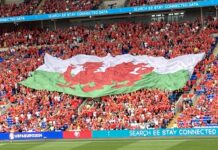This article was translated by John R. Bopp
We recently found a story in The Telegraph that seemed perfectly timed this year to celebrate the 75th anniversary of many of the important events the Basques lived during the Spanish Civil War.
Davey “Potato” Jones was a Welsh captain in the British Merchant Marine who, along with other British captains, played a significant role in the story of the Basques who fought against the Francoist military coup.
The British government forgot, during this war of democracy against fascism, the role the Basques played in the German blockade of the British Isles throughout the First World War. The shipping company owned by Ramón de la Sota y Llano lost, between 1914 and 1918 to German submarine-launched torpedoes, 20 freighters (a total of 50,000 tons) because of the risky decision to collaborate with the English Admiralty, who rented part of the fleet. For this, the British government bestowed upon him, on March 9, 1921, the title of Knight Commander of the Order of the British Empire for being a good friend to England and her citizens. The British consul in Bilbao, Madden, highlighted at the ceremony when the order was bestowed, on April 29 of that same year, that “Mr. Sota’s boats, with their brave crews, set sail loaded with minerals for England, defying the submarine campaign”. By the way, it was that same Ramón de la Sota who, as a member of the Basque Nationalist Party, elected in 1918 as a deputy to the Courts in Madrid for Balmaseda, who said:
“We have to elect leaders for a strange body, for the Spanish Courts in Madrid. The Basque deputies whom we send there must know that they are foreigners in those Courts, that they are not going to defend the interests of Spain, but rather the sacred ones of their homeland, Euzkadi”
The British government, fifteen years later, paid back the Basque nationalists, who were leading the Basque Country in the fight against fascism, by signing the Non-Intervention Pact, and allowing London to be the headquarters of the Non-Intervention Committee. This meant, in practice, that France and the UK would not support the republicans, and that Germany and Italy could limitlessly help the rebels, with the consequences we all know about and are still suffering.
But, fortunately for the Basques, one thing was the British government, scared and unable to react against the power that fascism was attaining in Europe, and another were the British citizens. We’ve mentioned many other stories before about the Basque War Children (all in Spanish) who found refuge in Great Britain. But we’ve only scratched the surface of those British ships and sailors who broke through the blockade to help those children and to transport supplies to the Basques who were fighting against the insurgents.
The story of one of those captains is discussed in the Telegraph article, and the search for information one of his descendents has done to create a profile of this historical figure. The article talks about how he transported hidden weapons in the boat he captained, with the intention of delivering them to the port of Bilbao. But with a bit more searching, we’ve found the story of another Welsh captain, who also participated in helping the Basque republicans and who tells how the protagonist of this entry picked up 1,000 Basque refugees at the Port of Bilbao under a bombing raid and took them away from the war, avoiding not only the boats of the rebels, but also of the Royal Navy itself.
It’s a true tale of the wolves of the sea. By the way, his activities made him so famous in Great Britain that a famous singing duo even wrote a song about him!
The Thelegraph – 21/6/2012 – Gran Bretaña
An online encounter with my uncle, the gun-running ‘Potato’

Apropos of not much, I got involved in a chat about family trees, which prompted me to investigate out the tale of my only (as far as I know) notable forebear, a Welsh cargo ship captain named Davey “Potato” Jones. Potato Jones, – my great, great uncle – hit headlines worldwide in 1937, including in this newspaper, as the mouthiest of a group of British merchant skippers planning to run the blockade of Bilbao. Franco had attempted to cut off access to the Basque port to starve Spanish Republicans.
(Continue) (Automatic Translation)
—————————————–
Ceredigion Council Country – Gran Bretaña
‘Thirty Eight Years at Sea’, Memories of Captain Lewis James Herbert, Borth (1900-1981)
I decided it was time for me to return home and I travelled via the Cunard to Southampton. I decided to call in at Cardiff and see what the prospects of employment were. To my surprise, I was immediately offered a berth as Chief Officer. I agreed to accept on one condition – that I had ten days at home. The owner was surprised at this request, but I explained to him that I had just returned from Canada and that I was engaged to be marries. As the owner knew my prospective wife to be, this was arranged. Twelve months later, we were marriesand the onwer came to the wedding and stayed in Borth for a week. A few months later I was promoted Master in the same firm and remained with them until all the ships were sold. When the ship on which I was serving was sold. the new owner asked me to remain. Judge my surprise, when I was told that the ship was now chartered to the Spanish Government and ‘promised me the moon’ if I agreed to stay. Sad to relate the promise never materialised! The Spanisg Civil War was then at its height. All went well for a while but eventually we were told to run the blockade to a North Spanish port. To wait for this run, we had to proceed to the fishing port of St. Jean de Luz in South West France and await orders. I was thoroughly enamoured with this delightful port, so much so, that we named our first daughter Jean. Orders came to proceed to Santander and we arrived without sighting and of General France’s warships. We discharged our cargo, sometimes under difficult conditions, (Franco’s aeroplanes were droppingbombs) and than we were equipped to carry refugees to France. Also in port was the legendary Captain ‘Potato’ Jones, another vessel.
(Continue) (Automatic Translation)
The Two Leslies – Old Potato Jones / Now You’ve Been and Gone and Done It (1937)
Last Updated on Dec 20, 2020 by About Basque Country





